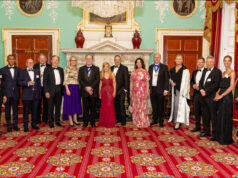Despite a host of negative indicators, South African equities have hit record levels and stayed there, as international investors ignore the noise in the hunt for investable assets. Across the continent, the story seems to be the same.

WHEN SOUTH African police opened fire on striking miners at Lonmin’s Marikana mine, killing 34, it confirmed many of the fears of international observers – that the politics of labour in the country were set to spill over into wider unrest.
With firebrand politician and deposed ANC youth leader Julius Malema quick to capitalise on the tension and restart calls for nationalisation that had started to drift away from the public consciousness, preconceptions of the risks to business in sub-Saharan Africa’s biggest economy looked set to be verified.
The South African economy has been rattled repeatedly in recent months. In July, the central bank revised down its growth estimates from 2.9 per cent to 2.7 per cent, while the World Bank lowered its forecasts from 3.1 per cent to 2.5 per cent. Manufacturers and the export sector have been shedding jobs at an alarming rate, and business confidence is at a 12-year low.
Releasing its report in July, the World Bank said that inequality in the labour market and the wider economy were a threat to stability, and that the country was locked in a “vicious, self-perpetuating cycle of inequality”.
With the spectre of violent labour disputes stalking the country’s politics, and the ongoing chaos in the eurozone holding back any export-driven recovery, there are few signs that these conditions are going to improve in the near term.
However, the Johannesburg Stock Exchange has been riding high. The FTSE/JSE Africa All Share Index breached 35,000 for the first time in its history in August and has stayed there despite the ongoing turmoil in South African politics.
Some analysts suggest that South Africa, despite all of its concerns, is emerging as a kind of safe haven for investors who are looking for alternatives to battered European markets.
“I think a lot of it is emerging market proxy buying,” Warwick Lucas, equity analyst at Imara S.P. Reid, told Gateway to Africa. “In other words, someone says whether we buy a retailer here or in Mexico or Brazil, it doesn’t matter – a emerging market retailer is nevertheless an emerging market retailer – and then bundle it all together.”
Developed markets have been susceptible to rapid changes in risk appetite, as investors look for signals that the European Central Bank and policymakers in Europe’s major economies will be able to structure some new package to start to bring the eurozone’s heavily indebted economies back towards sustainability. The possibility of sovereign default in major countries, including Italy and Spain, has not entirely receded.
At the same time, the USA has been displaying mixed signals, with some suggesting that the economic recovery there may be on the verge of derailing. Many in the market are anticipating a further injection of capital into the financial system by the Federal Reserve – so-called ‘quantitative easing’ (QE), which would see the central bank printing dollars in a bid to try to free up liquidity for banks to lend to the real economy. With an election looming, and the economy a key battleground for candidates, the political pressure to promote measures that appear to be reinforcing a recovery will grow.

Another round of QE would most likely lead to a rally in riskier assets, including emerging market equities. Even in its absence, South Africa, which has a relatively deep and technically sophisticated stock market and some companies with international standards of corporate governance, seems to be benefitting from a global lack of confidence. For investors, the country looks comparatively attractive, despite its position as an emerging market and its weakening fundamentals.
As Lucas said: “The broader problem globally is a lack of quality investment avenues. A case in point, the third largest bond market in the world happens to be Italian. Four years ago, that was investable. It’s not now.”
In that context, the more developed emerging markets are looking a lot less risky, according to Lucas.
“After the financial crisis I had hoped that mentality would take hold, and you would start seeing a different way in which developed world fund managers would look at emerging markets… to some degree that’s happened, but probably not enough,” he said.
“If you’d said to me 10-12 years ago, when you’d had the Asian crisis, that us guys in the emerging markets are seen as higher quality than OECD, we’d have laughed our heads off. And yet here we are. [Developed] markets have been shot to pieces.”
However, foreign investors, moving with the vagaries of politics in Europe and without a full understanding of the political dynamics of emerging markets, are susceptible to knee-jerk reactions, meaning that markets can reverse dramatically.
“You can certainly see it,” Lucas said. “It’s all well and good when you’ve got that herd behaviour driving things up, but it also makes for murderous turnaround if it does go south. And a good example of that with the shooting [at Marikana] was the retailers, which was one of our most heavily foreign-owned sectors, got slaughtered.”
Platinum stocks – Lonmin in particular – were hammered in the aftermath, as more industrial action loomed at other facilities. Implats warned that the industry faced severe risks. But even so, the effect on the overall index was limited.
By the end of August, the index was pushing for 36,000, as more hints that the US’ Fed might go back into the markets pushed up commodity prices, boosting the prospects for South Africa’s mining sector.
Other African indices have benefitted from the global shifts towards emerging markets, although, with thinner markets they are more vulnerable to external shocks. The Nairobi Stock Exchange, which had a torrid 2011, has rebounded strongly this year. The NSE all-share index has risen more than 22 per cent across the first half of the year. Elsewhere on the continent, the Ugandan Stock Exchange has seen a more than 25 per cent increase, while Malawi, Namibia, Nigeria and Tanzania have all seen increases of more than 10 per cent.
www.gatewaytoafrica.com









